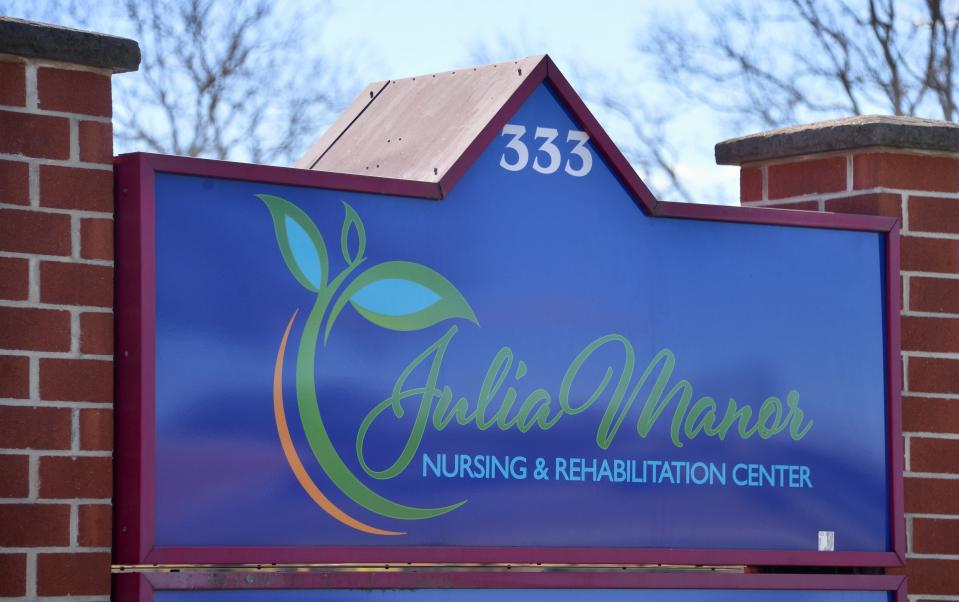She was sent to a nursing home for temporary care, but she died. Now her family is suing
Cheryl Fitzgerald, her sisters say, was a kind soul who loved Elvis and enjoyed traveling from her home in Hagerstown to Graceland to pay tribute to The King.
She loved animals, too, and she wrote poetry. She'd written poems about a son who was stillborn; he'd been her only child.
And she was fussy about her nails; they always had to be manicured just right.
She'd had hardship in her life, her sisters said, notably the loss of her baby. She'd been divorced for many years and had never remarried. But she had a good sense of humor and kept her siblings entertained.
One sister, Donna Rapp of Hagerstown, said simply, "she was my best friend."

On April 1, 2022, Cheryl was admitted to Meritus Medical Center for cellulitis of the legs and resulting sepsis, according to medical records obtained by her family's attorneys. In mid-April, she was transferred to a local nursing home for rehabilitation. It was to be a temporary stay, and her family was making plans for when she would be released. There was, after all, that new Elvis biopic to see.
But May and June passed, and Cheryl had not yet been released. On July 10, her family found her unresponsive in her room. At their insistence, she was taken back to Meritus by ambulance. Her appearance and condition were so concerning when she arrived that the attending physician reported suspected neglect, according to hospital reports provided by her family's attorneys.
Despite efforts by the hospital staff, Cheryl died on July 11. She was 66.
Her siblings don't believe Cheryl should have died. They believe the nursing home, Julia Manor, did not provide the care she should have had. The state Office of Health Care Quality investigated the facility last summer, reviewing 84 patient charts and 25 complaints. The facility was cited for 41 deficiencies.
Fitzgerald's estate is now suing Hagerstown Health Care LLC, the operators of Julia Manor, for malpractice. Her siblings' attorneys, Kelly A. Donohue and AJ Serafini, are seeking an undisclosed amount in compensation, according to court documents.
Julia Manor has denied the claim in a filing with the Health Care Alternative Dispute Resolution Office, where malpractice claims are initially filed in compliance with state law. Julia Manor raised a number of defenses in its general denial, including that some of the claims were caused by others or were due to pre-existing conditions.
Julia Manor Administrator Jared Zampelli declined to comment to The Herald-Mail on the pending litigation, but provided a statement on behalf of the facility:
"Julia Manor Nursing and Rehabilitation Center’s first priority is the health and safety of our residents. Privacy laws prohibit us from sharing patient information.
"Julia Manor requires that its employees comply with state and federal healthcare regulations and works closely with regulatory agencies to address any concerns."
The lawsuit was accepted in Washington County Circuit Court on Jan. 12 and is currently pending. But Fitzgerald's siblings wanted to tell her story, they said, to help prevent other families from having similar experiences. The story they told The Herald-Mail echoes the claims in the suit and is consistent with findings in the state's inspection report.
➤ Click here to read the state's inspection report
➤ Read the lawsuit at the end of this story
What happened to Cheryl Fitzgerald?
Cheryl Fitzgerald had had knee replacement surgery at one point, and was having trouble walking, her sisters told The Herald-Mail. She'd had a fall, in fact. In early 2022, she was a patient at Meritus Medical Center and was released on April 7 to Julia Manor for short-term rehabilitation with a diagnosis of cellulitis in her legs and an ulceration on her right heel, according to court documents.
She also had a Foley catheter that was placed during her stay at Meritus because of "an episode of acute urinary retention," the documents say. It was to be removed once she was ambulatory and a voiding trial was performed.
Although her stay at Julia Manor was to be temporary, her condition began to deteriorate, her sisters said. She developed an infection in her colon. She consistently lost weight. The voiding trial was never performed. And she told them things about her care that troubled them.

"She would talk about how they were abusive … the whole time she was there," said Cynthia Rowe, Fitzgerald's middle sister.
"She called me crying one time and said that she was in a wheelchair and they put her in the cafeteria and left her in there from 6 a.m. to 12 — to noon" while the floor in her room was being waxed, Fitzgerald's youngest sister, Alicia Reihart, alleged. "And when I called in to talk to them, they said, 'oh, well that's not true. We checked on her and we offered her to lay down in another room, and she refused.'
"When I talked to Cheryl, Cheryl said 'that's not true,' " Reihart said. "She told me that they did not offer (another room); they just left her in there." The inspection report cites a similar incident involving another resident.
Fitzgerald told Reihart "she wasn't feeling good," which Reihart said was "an ongoing issue also — this stomach pain. And I called in, talked to the social worker, I talked to the nurses. I finally made an appointment myself for her to go to get that checked out, to get the abdominal pain checked out.
"And they told me if I made the appointment, I would be responsible to get her there and bring her back," Reihart said. But because her sister wasn't walking, she couldn't transport Fitzgerald on her own. She was told that if the nursing home scheduled the appointment, they would have to provide the transportation.
"So they were supposed to do that," Reihart said.
"She had other complaints, but they didn't make an appointment," Rowe added.
An appointment was made with a urologist regarding the catheter, but that was canceled, according to court documents, because she had developed a clostridioides difficile infection of the colon, commonly known as C.diff.
"They never followed up on that," Rowe said. Physician Marc Itskowitz, who reviewed Fitzgerald's records for the suit, corroborates that in an affidavit included in the filing.
Fitzgerald's sisters said there were issues with her planned therapy as well.
"When we would see her, when we would go in, she'd be just laying in bed," Rowe said, "and we were saying, 'Cheryl, are they getting you to walk?'
"We said 'are you doing the therapy?' And she said they just come in and they just throw a ball back and forth is what she told us," except for one therapist who "did try to give her a little bit more … but she continually complained that the nurses were mean, abrupt, rude; (and she was) neglected."
Her long hair had become matted to the point that Reihart had to cut it almost to her scalp — and when she did, Reihart discovered an abscess and a cyst on her sister's head, she said.
The abscess, Reihart said, was emitting a strong odor.
Reihart and Rowe said they reported the abscess to the nursing staff. "They said, 'oh that's just a cyst and that's a normal odor,'" Rowe said. The Itskowitz affidavit notes that her family found the abscess, but does not record a response from the staff.
"I talked to the nurses several times, and I got a complete different story," Reihart alleged. Fitzgerald "kept telling me that she lost like 50 pounds, which I thought was a lot. So I called and the nurse said, 'No, that's not true. She fluctuates between three pounds since she's been here. She goes up three, goes down three, goes up three.' "
But according to a review of Fitzgerald's records, she had lost more than 80 pounds in the three months since her admission to Julia Manor in April.
The state's inspection found that the staff was aware of the weight loss, but failed to notify the attending physician.
Three charged in Hagerstown homicide: Three charged with murder of man whose body was found in Hagerstown's West End in January
A turn for the worse: 'Cheryl's not eating anything'
Finally on July 10, 2022, her sisters went to see her at Julia Manor and found her unresponsive.
"When we got there, the nurse that was taking care of her stopped us in the hallway and said, 'I just want you to know that Cheryl's not eating anything. She's not eating or drinking, and she's not taking her medication'," Reihart said. "And I said, 'Well, what's going on?' And she said, 'I don't know.' " There were no reports from the previous shift, the nurse said.
When they got to Fitzgerald's room, her sisters said, they knew right away something was wrong. "Usually she'd be up sitting," Rowe said, "but she was unresponsive." They tried to get her attention, but without avail.

They summoned the nurse, who told them Fitzgerald's vital signs had been fine an hour before and she had eaten a little gelatin.
But Fitzgerald's roommate told them Fitzgerald had been "out of it" all day, they said.
Reihart and Rowe asked the staff to call 911, Rowe alleged. "They refused and said that would be our responsibility," she said. "And then the social worker came in, standing over Cheryl's bed, and Cheryl was not responsive; not responding to anything."
The staff offered to have a doctor see Fitzgerald the following Monday, Reihart alleged. "I said 'she's not gonna make it through the night,' " she said.
Rowe said Reihart "pretty much begged" staff to call 911. Reihart said staff made her leave the room.
"They said I was making things worse because I was crying," Reihart said. "I knew Cheryl was in the process, the first stages of dying."
The nursing home's records, according to the state's inspection report, recorded that Fitzgerald's family was "argumentative" and "adamant" that she needed attention, although there were "no vital alerts" at the time
Fitzgerald was ultimately transported to Meritus, where she was diagnosed with pneumonia, urinary tract infection with shock, lactic acidosis, acute kidney failure and wounds and abrasions to various parts her body, according to the admission summary from the hospital provided to The Herald-Mail by the family's attorneys.
The attending physician concluded that:
"There are multiple findings which raise the question of neglect: She has 2 layers of absorbent briefs, which are soiled, suggesting prolonged periods between changes. She has bruising on her upper arm consistent in pattern with being grasped (on) it very firmly by hand. She also has purpura and ecchymosis (small blood vessels leaking blood under skin) that raise the question of whether she was left on top of the bedpan for prolonged period."
On July 11, fewer than 24 hours after she had been transported to Meritus, Cheryl Fitzgerald died.
Harlem Wizards returning to Hagerstown: Harlem Wizards to face Southside Ballers squad full of locals. Here's how to get tickets.
An inspection, citations and fines for Julia Manor
The Maryland Office of Health Care Quality conducted its inspection at Julia Manor last summer, a year after Fitzgerald died. Her case was among those reviewed for the resulting report. Patients and staff members were identified in the report by numbers to preserve their privacy, but her estate's attorneys provided Fitzgerald's number identification to The Herald-Mail.
The report, which can be found online at Medicare's website, resulted in 41 health citations. According to the Medicare site, the average number of health citations for such facilities in the United States is 9.3; in Maryland, the average is 16.2.
Most of the deficiencies, according to the report, resulted in minimal harm or potential for actual harm and affected few patients.

But a few were found to present immediate jeopardy to resident heath or safety.
"Based on record review and staff interview, it was determined that the facility failed to ensure that their residents were free from abuse and neglect," the report said. "This was evident for 2 out of 26 residents reviewed for abuse and neglect."
One of those two residents was Cheryl Fitzgerald.
The inspection found a series of failures to report changes in her condition or keep adequate records that would have signaled her health was declining.
The night Fitzgerald was taken to Meritus, according to the inspection report, a member of the nursing home's social service staff recorded that Fitzgerald was being sent to the hospital at her family's request:
"as [her Health Care Agent] is argumentative and adamant that there is something medically wrong with [resident]. [Resident's] vital signs are stable and no vital alerts at this time contrary to family's adamancy. [Resident's] symptoms of concern for the family are variable to the attention it receives and is observed by various staff and witnesses."
But a review of hospital records from the following morning indicated Fitzgerald had been admitted to Meritus with septic shock, pneumonia and a urinary tract infection.
"Septic shock is a life-threatening condition characterized by sepsis-induced hypotension that does not respond to treatment," the inspection report notes. "Without timely treatment, sepsis/septic shock can rapidly lead to tissue damage, organ failure and death."
The inspection also found immediate jeopardy to resident health or safety because "The facility failed to ensure that residents received optimal quality of care that aligned with standards of professional practice," affecting four of 84 residents reviewed.
And it found actual harm in Fitzgerald's case because "facility staff failed to provide nutritional services for their residents that aligned with professional standards of practice. This deficient practice resulted in harm to (Fitzgerald) due to a weight loss of 31% of their body weight in 3 months. This was evident for 1 of 5 residents reviewed for nutrition."
The Medicare website gives Julia Manor a rating of one star out of five, which it deems "much below average." The rating is based on its last three inspections as well as findings from the most recent three years of complaint inspections and three years of infection control inspections.
The Medicare site also notes that Julia Manor was fined $276,500 in penalties after the last report, in addition to fines of $3,145 assessed last May.
Support personnel of year candidates: Washington County Public Schools announces finalists for 2024 support person of the year
'I just hope that it never happens to anyone else'
The oldest of Fitzgerald's surviving siblings, Donna Rapp, didn't say much during the interview with The Herald-Mail, but frequently dabbed at tears while her sisters spoke. But ultimately, she said she wanted to share Fitzgerald's story because "I just hope that it never happens to anyone else."
A surviving brother, Walter Fitzgerald, could not be present for the interview but also wanted her story told, his sisters said. They wanted "to make people aware that it can happen," Reihart said, and "in some way to honor her."
"We were fearful that there would be something said that … she was this combative, uncooperative person," Rowe added.
"And we want people to know that that was not Cheryl."
This article originally appeared on The Herald-Mail: Hagerstown nursing home Julia Manor named in lawsuit after woman dies

